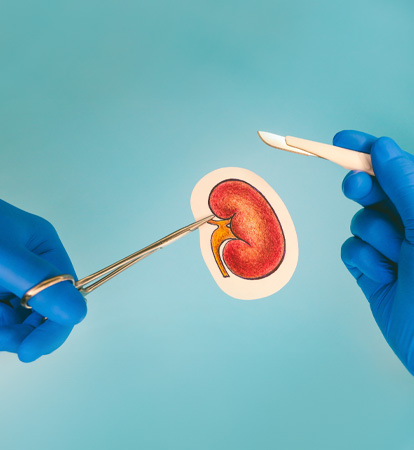A kidney transplant is a surgical procedure where a healthy kidney is transplanted into a patient with kidney failure. This life-saving treatment allows individuals to regain proper kidney function and eliminate the need for dialysis. The donor kidney can come from a living or deceased donor. The transplantation process involves meticulous matching to reduce the risk of rejection. Successful kidney transplants significantly improve the recipient's quality of life, providing renewed kidney function and often allowing a return to a more normal daily routine.
Important Facts To Know About The Procedure
Here are a few essential facts about the kidney transplant procedure, covering donor options, matching considerations, and post-transplant care for optimal outcomes.
- The Transplant Process: Kidney transplant surgery involves the transplantation of a healthy kidney from a living or deceased donor into a recipient with kidney failure. The process begins with an evaluation to determine the suitability of both the donor and the recipient. Factors such as blood type compatibility, tissue matching, and overall health are assessed. Once a suitable match is found, the transplantation surgery is scheduled.
- Living and Deceased Donors: Kidney transplants can be performed using kidneys from living or deceased donors. Living donors are often family members or close friends willing to donate one of their kidneys. Deceased donors, on the other hand, provide kidneys through organ donation programs. Both options have proven successful, and the choice between them depends on individual circumstances and donor availability.
- Immunosuppressive Medications: Following kidney transplant surgery, recipients must take immunosuppressive medications to prevent the body from rejecting the transplanted organ. These medications suppress the immune system's response, allowing the body to accept the new kidney. Compliance with the prescribed medication regimen is crucial for the long-term success of the transplant.
Benefits Of Kidney Transplant Surgery
Below are the transformative benefits of kidney transplant surgery:
- Improved Quality of Life: One of the primary generic benefits of kidney transplant surgery is the significant improvement in the quality of life for recipients. The procedure allows individuals to regain kidney function, reducing or eliminating the need for regular dialysis treatments.
- Enhanced Longevity: Kidney transplant recipients often experience improved life expectancy compared to those relying on dialysis. A successful transplant can provide individuals with an opportunity for a longer and healthier life.
- Freedom from Dialysis: Kidney transplant surgery liberates individuals from the constraints of regular dialysis sessions. This freedom allows recipients to resume a more normal lifestyle, including increased flexibility in daily activities and travel.
- Improved Physical Health: A successful kidney transplant contributes to improved overall physical health. Restored kidney function helps regulate blood pressure, balance electrolytes, and manage fluid levels in the body, positively impacting the recipient's well-being.
- Enhanced Mental and Emotional Well-Being: Kidney transplant surgery not only addresses physical health but also positively influences mental and emotional well-being. Recipients often experience reduced stress and anxiety associated with chronic kidney disease and dialysis, leading to an improved overall outlook on life.
- Risks and Considerations: While kidney transplant surgery offers numerous benefits, it's essential to be aware of potential risks and considerations. These may include the risk of rejection, side effects of immunosuppressive medications, and the need for ongoing medical management. However, advancements in medical technology and post-transplant care have significantly minimized these risks, making kidney transplantation a well-established and successful intervention.
Conclusion
Understanding the important facts about kidney transplant surgery is crucial for individuals facing kidney failure and considering this life-changing procedure. The generic benefits, including improved quality of life, enhanced longevity, freedom from dialysis, improved physical health, and enhanced mental well-being, highlight the transformative impact of kidney transplantation. While risks and considerations exist, the overall success and positive outcomes associated with kidney transplant surgery make it a hopeful and viable option for those in need of renal replacement therapy.



























